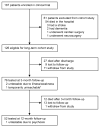Delirium as a predictor of long-term cognitive impairment in survivors of critical illness
- PMID: 20473145
- PMCID: PMC3638813
- DOI: 10.1097/CCM.0b013e3181e47be1
Delirium as a predictor of long-term cognitive impairment in survivors of critical illness
Abstract
Objective: To test the hypothesis that duration of delirium in the intensive care unit is an independent predictor of long-term cognitive impairment after critical illness requiring mechanical ventilation.
Design: Prospective cohort study.
Setting: Medical intensive care unit in a large community hospital in the United States.
Patients: Mechanically ventilated medical intensive care unit patients who were assessed daily for delirium while in the intensive care unit and who underwent comprehensive cognitive assessments 3 and 12 mos after discharge.
Measurements and main results: Of 126 eligible patients, 99 survived>or=3 months after critical illness; long-term cognitive outcomes were obtained for 77 (78%) patients. Median age was 61 yrs, 51% were admitted with sepsis/acute respiratory distress syndrome, and median duration of delirium was 2 days. At 3-mo and 12-mo follow-up, 79% and 71% of survivors had cognitive impairment, respectively (with 62% and 36% being severely impaired). After adjusting for age, education, preexisting cognitive function, severity of illness, severe sepsis, and exposure to sedative medications in the intensive care unit, increasing duration of delirium was an independent predictor of worse cognitive performance-determined by averaging age-adjusted and education-adjusted T-scores from nine tests measuring seven domains of cognition-at 3-mo (p=.02) and 12-mo follow-up (p=.03). Duration of mechanical ventilation, alternatively, was not associated with long-term cognitive impairment (p=.20 and .58).
Conclusions: In this study of mechanically ventilated medical intensive care unit patients, duration of delirium (which is potentially modifiable) was independently associated with long-term cognitive impairment, a common public health problem among intensive care unit survivors.
Conflict of interest statement
Figures



References
-
- Herridge MS, Cheung AM, Tansey CM, et al. One-year outcomes in survivors of the acute respiratory distress syndrome. N Engl J Med. 2003;348:683–693. - PubMed
-
- Hopkins RO, Jackson JC. Long-term neurocognitive function after critical illness. Chest. 2006;130:869–878. - PubMed
-
- Rothenhausler HB, Ehrentraut S, Stoll C, et al. The relationship between cognitive performance and employment and health status in long-term survivors of the acute respiratory distress syndrome: results of an exploratory study. Gen Hosp Psychiatry. 2001;23:90–96. - PubMed
-
- Phillips-Bute B, Mathew JP, Blumenthal JA, et al. Association of neurocognitive function and quality of life 1 year after coronary artery bypass graft (CABG) surgery. Psychosom Med. 2006;68:369–375. - PubMed
-
- Jonsson L, Lindgren P, Wimo A, et al. Costs of Mini Mental State Examination-related cognitive impairment. Pharmacoeconomics. 1999;16:409–416. - PubMed
Publication types
MeSH terms
Grants and funding
LinkOut - more resources
Full Text Sources
Other Literature Sources
Medical

